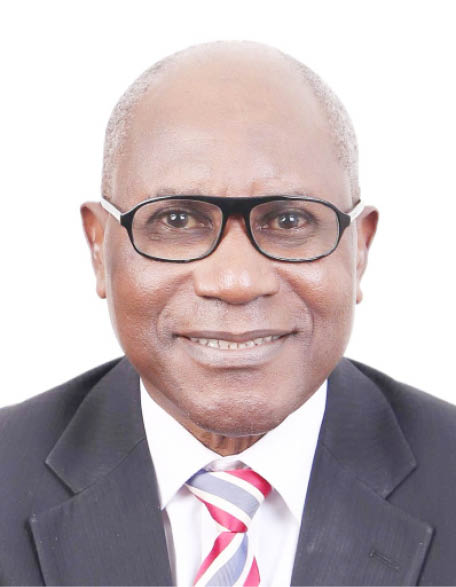The Chairman of the Council of Registered Builders of Nigeria (CORBON), Dr Samson Opaluwah, in this interview, identifies the causes of building collapse and reveals strategies his council has come up with to address the menace.
As the new CORBON chairman, what priority areas will you focus on?
President Muhammadu Buhari told us that we should address the prevalent issue of building collapse in Nigeria and we have promised that we’re going to handle it properly. The Minister of Works, in his inaugural address, also spoke to us about professionalism; that our members should comport and conduct themselves as experts.
We accepted these and promised we’re going to take their admonitions even further to create synergy among all the professionals in the built environment. This is because building is a multi-stakeholder business. There are so many other professionals that work with us in order to have a successful building project. And when we work together, we are bound to have a successful outcome.
As for building collapse, we have looked at various reasons, and there are quite a number of them that are grouped into five. I will take each of them as a council, analyse it and begin to proffer solutions.
In the past week we sent out an advert on what the public should demand for their building projects and how they will need to acquire the services of registered builders in order to be able to have successful projects.
Meanwhile, these are some of the things we’re doing. We are involved in capacity building. We are training partners with the federal government on the N-Power built programme. We have trained over 40,000 artisans to level one on the National Skills Qualification Framework (NSQF). We are also deeply involved in building the capacity of our builders, registered builders and prospective builders such that they will be able to practice not only in the Nigerian economy, but in the emerging economies of the world.
What are the causes of building collapse that you have identified?
So far we have identified about five. Number one is technical: what type of design, what type of analysis was carried out, is the design okay?
The second reason is regulatory. Under this we have three groups that come into play: the personnel need to be regulated. For instance, the personnel on the building site. The second regulation is about materials. Are they what are supposed to be used? The third level of regulation is the government itself. A government body is supposed to say, “Yes, you can build this house here. These are the standards a building is supposed to be subjected to. Approvals are necessary.
The third causative reason is abuse. People are doing things as if there is no law in the country. You have built a bungalow, you suddenly discover that there is a huge market for tenancy and you decide to raise two floors on top of the bungalow. Of course it will collapse because it was not designed for that. You have a storey building and suddenly the building that was designed for residential purpose, you want to install a factory and you send out your tenants and begin to mount machines, of course, the building will fail.
The fourth reason is legal. As we speak, we have a national building code, but there is no law enforcing it. So, it is nearly a building code approved by the Federal Executive Council (FEC) for use in Nigeria, but it can only become legal when there is a law saying everybody building in Nigeria must use the methodologies and the material specifications and the personnel that have been spelt out in the building code.
Number five is what we call force majeure. It’s possible that accidents happen. There could be flooding, there could be earthquake and there could be torrential rainfall; all these are reasons why buildings collapse.
So, if you take each of the reasons, there are different ways to arrest them, and that is why in the seventh council of CORBON that I lead, we are working out strategies.
One of our strategies is the establishment of the Project Evaluation Monitoring Unit (PEMU). We have a sub-committee called the practice committee which decides how the practice of building in Nigeria should be done. That committee now has another sub-committee called PEMU. You’ll see some of the vehicles we have outside belong to these committees and sub-committees. They are to be deployed nationally. We have launched the ones for the North Central in Abuja. Every zone of the country and every state will have a PEMU consisting of common people and registered builders and they will be visiting sites to carry out advocacy; letting people know what is a correct practice and to see what they are doing and how they can do it right and better. If they fail to heed to professional advice, then they will be recommended for sanctions.
Another thing that we are doing is conducting training. Even if we have no law yet backing the National Building Code, we treat artisans on correct practices and they acquire more competence from us.
So, we are not only training our builders, we are also training the artisans, because no matter how intelligent a builder is, the outcome of his product will be done by the artisan, and if the artisan is not competent, the quality will be poor.
This seems like a big challenge. So how are you going to address the knowledge gap between artisans and professionals?
In the normal school system, when you want to train there must be a syllabus; what the traditional artisanship or apprenticeship system lacks. So, first of all, what we did was that in seven building trades, including masonry, carpentry, painting and welding, we developed the National Occupational Standard – levels one to three, and by the time you reach level three you are approaching the level of a graduate. This we did in consultation with and approval of the National Board for Technical Education (NBTE). It may interest you to know that because the former technical school system has not produced the desired result, NBTE, through the Federal Ministry of Education, took a memo to FEC a few years ago and the federal government adopted NSQF.
NSQF is meant to train people anywhere they are. If you apply, it is not strictly informal; both literate and illiterates can now apply, but there is a caveat – That is that there must be a standard and the standard is based on the National Occupational Standard.
However, we require more resources. For these seven trades; we used our lean resources to develop them. There are more than 40 trades to be developed in the construction sector. So we need resources to continue.
Now, our sister organisation is the awarding body. So again, after they utilise the National Occupational Standard to train the artisans, they will come and test them and know their competency level. Then they will grade them and say okay, you are level one, you are level two, you are level three. Now, this system comes with randomisation. So, when you have a job that requires level one job, we know automatically what is attached to it. But how do we know? So, again, we went ahead and created a platform called the Labour Market Information System (LMIS). All these are done by CORBON so that we put people we train on the public domain. Their details are there on the internet. Their standards are there.

 Join Daily Trust WhatsApp Community For Quick Access To News and Happenings Around You.
Join Daily Trust WhatsApp Community For Quick Access To News and Happenings Around You.


